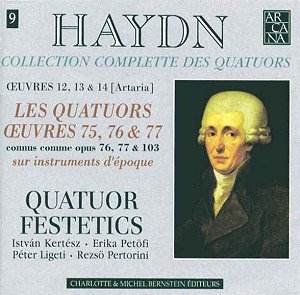|
This triple CD spans the last nine of Haydn’s eighty-three
numbered quartets. Many commentators consider these works to be his greatest
in the genre, indeed the climax of his career. The six which make up Opus
76 were written probably between 1794-7, the two quartets Opus 77 probably
date from 1798/9, and the composer’s last quartet, the melancholic two
movement Opus 103 in D minor, probably comes from 1803.
Complete recordings of Haydn quartets are not uncommon
so why choose this one, and why this series? There have in fact been two
more sets since this came out in 2000 and there are still more sets to
come in the spring 2003 and Spring 2004 before the complete edition is
available.
There is much to enjoy here. The pleasure is enhanced
by label Arcana’s beautiful presentation: a case with fold-over flaps,
excellent booklet notes (written by Laszlo Somfai) and helpful but not
overly detailed analysis of each work. There is also a note about the
editions used. The recordings are of a fine and clear quality. An important
difference from much of the competition is the fact that Arcana’s ‘Festetics’
quartet plays on original instruments. This lends an "authentic"
(please forgive this much embattled word) bias.
Istvan Ketesz the leader plays a Milanese violin of the
18th Century. Now and again its upper register jars and seems
a little thin, but it also has a mellow tone particularly down on the
G and D strings where it is something quite special. The opening of the
so-called ‘Sunrise’ quartet (Op.76 no.4), with its poised and delightful
rising melody, works wonderfully on this instrument. Erika Petofi plays
a German violin of c.1770, which supports and balances the ensemble. The
viola, especially notable in the darkly-hued colours of Op.76 no.2 (in
D minor) was made by Matthias Bolzano and is dated 1651. The cello played
by Rezso Pertorini is French and anonymous 17th Century. The
cello and viola are especially strong and in character. I particularly
liked the perfect tuning of the drone effects in the 1st movement
of the ‘Emperor’ quartet (around bar 70). One cannot guarantee that a
group of instruments made over 100 years apart, and in different countries,
will work together, but without a doubt these do.
I always say that performances on authentic instruments
are good as an alternative to a version on modern ones. This is not just
because of the instruments themselves, although that can be factor, but
because of the style of performance that seems to be a natural concomitant
of their use. Phrasing, bowing and indeed speeds adopted by the Festetics
may well be quite different from what one has come to expect. It is no
good relying on your Eulenberg editions of the scores because the editions
or texts as the booklet calls them, as used here, may well be different.
This is particularly noticeable with repeats. I quote from the booklet:
the texts "show a transition from the classical routine (both parts
of the sonata-form-like structure repeated to a new concept more characteristic
of Beethoven’s time, repeating only the first i.e. the Exposition as required
in Op.76 no.1 in G for example". You can expect, in addition, the
Development and Recapitulation sections to be repeated as marked in some
editions. This means that the Emperor Quartet’s 1st movement
comes out at almost twelve minutes instead of the average six and a half
or so. Indeed it seems somewhat perfidious not to repeat the second half
of this movement anyway especially when you realise that Haydn writes
in the score fifteen bars from the end ‘La seconda volta piu presto’.
The famous slow ‘Theme and variations’ movement of the
‘Emperor’ Quartet (Op.76 no.3) demonstrates another outcome of the "authentic"
approach. The Festetics play it in what might be considered a rather matter-of-fact
way, and there is no, or at least little, vibrato: they employ a straighter
bowing technique on gut strings. The tempo too is faster than you might
expect. All sentimentality has been removed, rather like a layer of varnish.
Comparing the timing of this movement with other groups proves the point,
for example they are over a minute faster than the reliable Kodaly Quartet
on Naxos (8.550129). On the whole, slow movements are faster but the others
remain as one might expect; indeed the Minuet and Trio in the Op.76 no.2
(the Fifths’) is rather steady and the Festetics adopt the policy, which
may be alien to most listeners, of adhering to the repeats in the da
capo of the Minuets.
What I have said concerning the Op.76 applies similarly
to the two great quartets of Op.77, with their equally balanced movements,
the 1st in G major being rather classical. and the second in
F major, pointing towards Beethoven.
These are everything you might expect from top quality
performances. The Quatuor Festetics demonstrate excellent articulation
and attention to detail clearly captured by producer Michael Bernstein.
The sound, which is often very beautiful, captures playing of much pathos.
This is carefully balanced and often passionate - especially in the Finales.
So on consideration, yes, I can warmly recommend the series to you.
Gary Higginson
|

